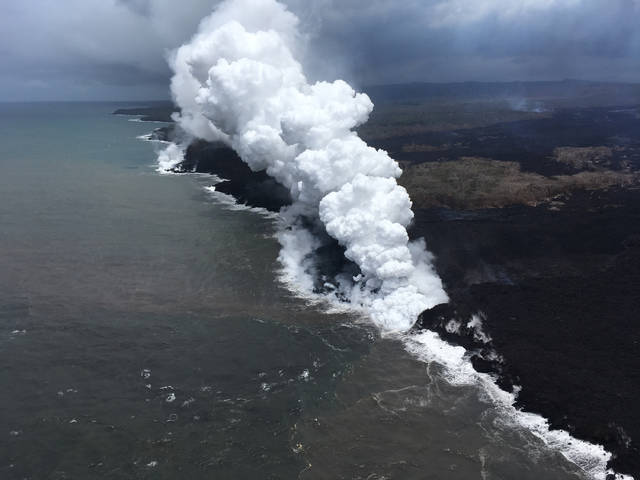HONOLULU — Lava crossed a key highway in the mostly rural district of the Big Island where Kilauea volcano was erupting, local authorities in Hawaii said Tuesday.
Highway 132 connects the commercial center of Pahoa with smaller towns and farms in the area.
Hawaii County said lava destroyed the local electric utility’s equipment on the highway, which knocked out power to Vacationland and Kapoho Beach Lots neighborhoods toward the coast.
Hawaii Electric Light Co. said it was evaluating how to provide power to these communities once the eruption is over but it won’t be able to finalize a plan until the area is stable.
The eruption has so far destroyed more than 400 of its utility poles, the company said.
The destruction came after rivers of lava flowed toward the ocean over the weekend, forcing officials to knock on doors and urge residents holding out in two evacuated neighborhoods to flee right away.
Molten rock trapped at least one person who was rescued by authorities. The Kilauea volcano has been unleashing danger on the remote, rural southeastern side of the island for nearly a month, displacing thousands of residents, destroying 37 houses and forcing businesses to shut down.
Lava was shooting up from cracks in the ground and blowing strands of volcanic glass.
Explosions at the summit were sending small bursts of volcanic ash as high as 15,000 feet (4,570 meters).
Wind was carrying volcanic glass, gases, pollution and ash particles to other parts of the island. Authorities on Tuesday advised residents to minimize exposure to avoid irritation to skin and eyes and breathing problems.
A new fissure has opened, bringing the total number of cracks spouting lava to 24 since the volcano began erupting on May 3, Hawaii County Civil Defense said.
Lava also has covered two wells at a geothermal plant. County officials said the plugged wells were stable and being monitored, and no dangerous gases have been released, such as hydrogen sulfide — a colorless, flammable gas that can be emitted by volcanoes or when organic matter and waste break down.
Ormat Technologies, a Nevada company that owns the Puna Geothermal Venture plant, said it could not assess the extent of the damage to the wells. The facility produces roughly one-quarter of the Big Island’s daily energy supply.
After weeks of scientific updates on the volcano, the U.S. Geological Survey took a lighter tone as it responded to a question on Twitter about whether it would be safe to roast marshmallows over volcanic vents.
“We’re going to have to say no, that’s not safe,” the agency’s volcanos account replied Monday, saying if the vent was belching volcanic gases, such as sulfur dioxide or hydrogen sulfide, the roasted marshmallows “would taste bad.” The gases generally smell like rotten eggs.
Hawaii’s Volcanoes National Park has been closed for 19 days and has no water due to damaged utility lines, said Jessica Ferracane, a spokeswoman for the National Park Service.
———
Associated Press journalist Audrey McAvoy contributed to this report.


